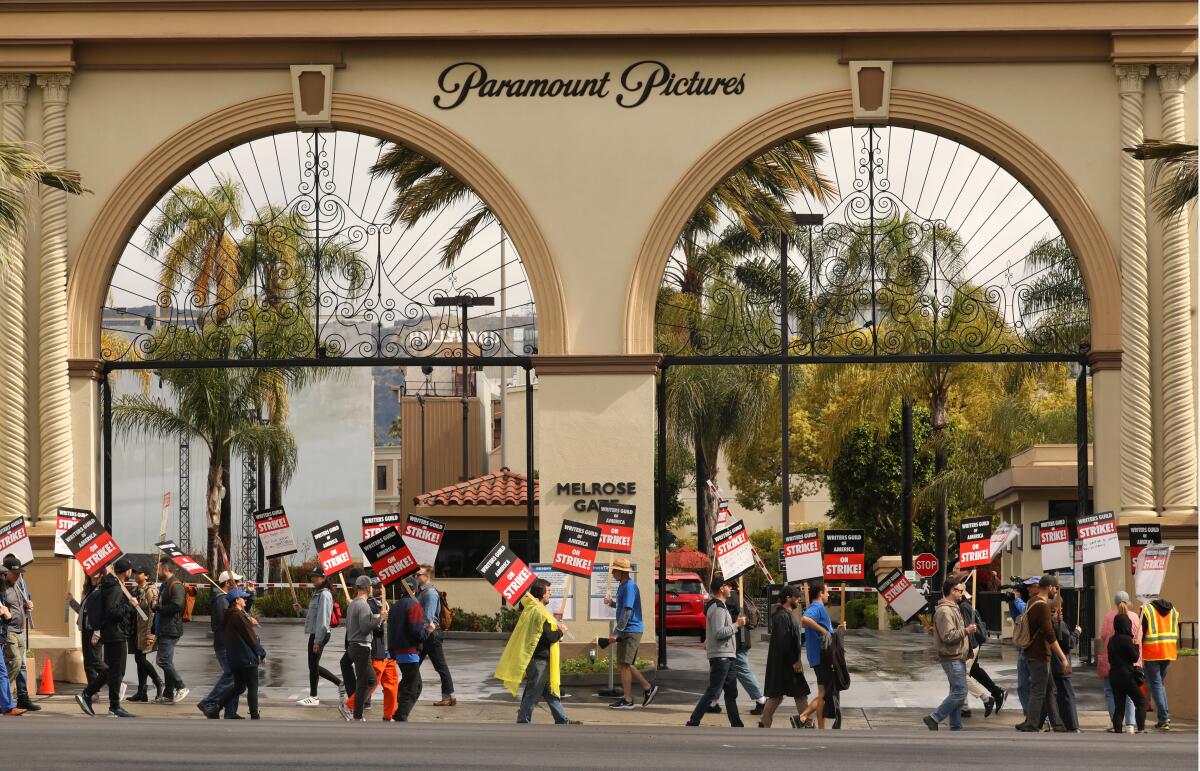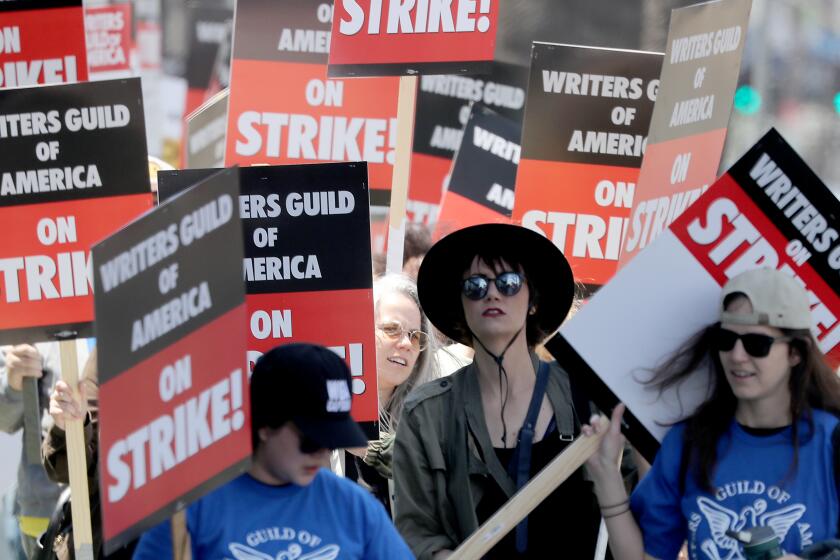Studios tout ‘comprehensive package’ to WGA. Union criticizes attempt ‘to get us to cave’

- Share via
The Alliance of Motion Picture and Television Producers issued a statement Tuesday night touting what it described as a “comprehensive package” that addresses the “highest priorities” of the Writers Guild of America.
“The offer recognizes the foundational role writers play in the industry and underscores the Companies’ commitment to ending the strike,” said the AMPTP, which bargains on behalf of the major studios and streamers.
That the alliance went public with its proposals first presented on Aug. 11 suggests that bargaining between the parties has yet to yield any significant breakthroughs that would end the months-long strike. Actors joined writers on picket lines last month, virtually shutting down all scripted production.
The 2023 writers’ strike is over after the Writers Guild of America and the Alliance of Motion Picture and Television Producers reached a deal.
Film and TV writers have been on strike since early May; earlier this month, the WGA and AMPTP resumed negotiations. Both sides have generally avoided commenting in public on the status of talks, until now.
On Friday, the WGA’s negotiating committee told its members that “the AMPTP offered responses to our proposals in all work areas,” but advised members to “be skeptical of rumors from third parties, knowing that the Guild will communicate when we think there is something of significance to report.”
The statement Tuesday from the AMPTP followed a meeting earlier in the day between WGA leaders and several top executives, including Warner Bros. Discovery Chief Executive David Zaslav, Netflix co-CEO Ted Sarandos, Walt Disney Co. CEO Bob Iger and NBCUniversal chief content officer Donna Langley.
The WGA negotiating committee, in a message to members late Tuesday night, said it agreed to meet with the studio leaders “in hopes that the companies were serious about getting the industry back to work.”
Details of its August 11th proposal by the Alliance of Motion Picture and Television Producers to the Writers Guild of America.
“Instead, on the 113th day of the strike — and while SAG-AFTRA is walking the picket lines by our side — we were met with a lecture about how good their single and only counteroffer was,” the WGA leaders wrote. “[T]his wasn’t a meeting to make a deal. This was a meeting to get us to cave, which is why, not 20 minutes after we left the meeting, the AMPTP released its summary of their proposals.”
The WGA committee said it would release a “more detailed description of the state of the negotiations” on Wednesday.
In its statement, the AMPTP said it is offering the largest pay bump for the WGA in 35 years, with wages increasing 5% in Year One of the proposed contract, followed by gains of 4% and 3.5% in subsequent years.
The WGA had sought a 6% increase to minimums and residual bases in the first year, followed by 5% increases in the second and third years.
A major sticking point in negotiations has been the WGA’s request to require a minimum amount of staffing in writers’ rooms, which have shrunk in size during the streaming era.
To address the issue, the AMPTP said it would allow the showrunner on high-budget streaming and pay-TV series to assign at least two mid-level writers to the production for at least 20 weeks of employment. It further proposed guaranteeing writers a minimum of 10 weeks of employment in development rooms.
Screenwriters have expressed concerns that the rapid acceleration toward streaming has shortened TV seasons, making it harder for writers to earn a living.
The National Day of Solidarity rally in Burbank featured speeches from Kerry Washington, Martin Sheen and Ron Perlman, drawing thousands of members from a multitude of labor groups showing solidarity for the WGA and SAG-AFTRA.
The studios said they offered a new compensation structure for development rooms, as well as “landmark protections” for writers surrounding the use of generative artificial intelligence, including guarantees that any written material produced by GAI will not be considered literary material.
The AMPTP said its offer would boost residuals for high-budget streaming shows (from $72,067 to $87,546 per episode for three exhibition years).
And to provide greater transparency in how well shows are doing — another key concern for writers — the WGA would receive quarterly reports that would include view hours per title.
“Our priority is to end the strike so that valued members of the creative community can return to what they do best and to end the hardships that so many people and businesses that service the industry are experiencing,” said Carol Lombardini, president of the AMPTP.
Some WGA members expressed exasperation that the AMPTP had gone public with its offer.
“Wait for the WGA replies that will contextualize what the current AMPTP offers giveth and then taketh away,” negotiating committee member David Simon wrote on X (formerly known as Twitter). “We don’t leak as a tactic; they do, whenever we read the fine print and refuse to immediately leap aboard their proposals.”
On Tuesday, more than 3,000 union members participated in a rally in front of Walt Disney Co.’s Burbank office to express solidarity with the film and TV actors and writers on strike.
More to Read
Inside the business of entertainment
The Wide Shot brings you news, analysis and insights on everything from streaming wars to production — and what it all means for the future.
You may occasionally receive promotional content from the Los Angeles Times.













